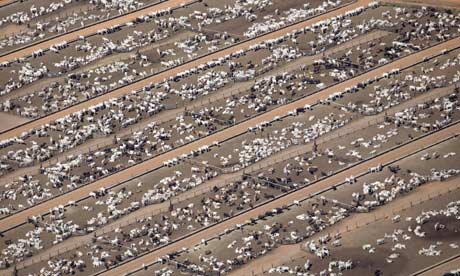As the global population surges towards a predicted 9.1 billion
people by 2050, western tastes for diets rich in meat and dairy products
are unsustainable, says the report from United Nations Environment
Programme's (UNEP)
international panel of sustainable resource management.
It says: "Impacts from agriculture are expected to increase
substantially due to population growth increasing consumption of animal
products. Unlike fossil fuels, it is difficult to look for alternatives:
people have to eat. A substantial reduction of impacts would only be
possible with a substantial worldwide diet change, away from animal
products."
Professor Edgar Hertwich, the lead author of the report, said:
"Animal products cause more damage than [producing] construction
minerals such as sand or cement, plastics or metals. Biomass and crops
for animals are as damaging as [burning] fossil fuels."
The recommendation
follows advice last year that a vegetarian diet was better for the planet from Lord Nicholas Stern,
former adviser to the Labour government on the economics of climate
change. Dr Rajendra Pachauri, chair of the UN's Intergovernmental Panel
on Climate Change (IPCC), has also
urged people to observe one meat-free day a week to curb carbon emissions.
The panel of experts ranked products, resources, economic activities and transport according to their environmental impacts.
Agriculture was on a par with fossil fuel consumption because both rise rapidly with increased economic growth, they said. Ernst von Weizsaecker, an environmental scientist who co-chaired the
panel, said: "Rising affluence is triggering a shift in diets towards
meat and dairy products - livestock now consumes much of the world's
crops and by inference a great deal of freshwater, fertilisers and
pesticides."
Both
energy and agriculture need to be "decoupled" from economic growth
because environmental impacts rise roughly 80% with a doubling of
income, the report found. Achim Steiner, the UN under-secretary general and executive director
of the UNEP, said: "Decoupling growth from environmental degradation is
the number one challenge facing governments in a world of rising numbers
of people, rising incomes, rising consumption demands and the
persistent challenge of poverty alleviation."
The panel, which drew on numerous studies including the
Millennium ecosystem assessment,
cites the following pressures on the environment as priorities for
governments around the world: climate change, habitat change, wasteful
use of nitrogen and phosphorus in fertilisers, over-exploitation of
fisheries, forests and other resources, invasive species, unsafe
drinking water and sanitation, lead exposure, urban air pollution and
occupational exposure to particulate matter.
Agriculture, particularly meat and dairy products, accounts for 70%
of global freshwater consumption, 38% of the total land use and 19% of
the world's greenhouse gas emissions, says the report, which has been
launched to coincide with UN World Environment day on Saturday.



